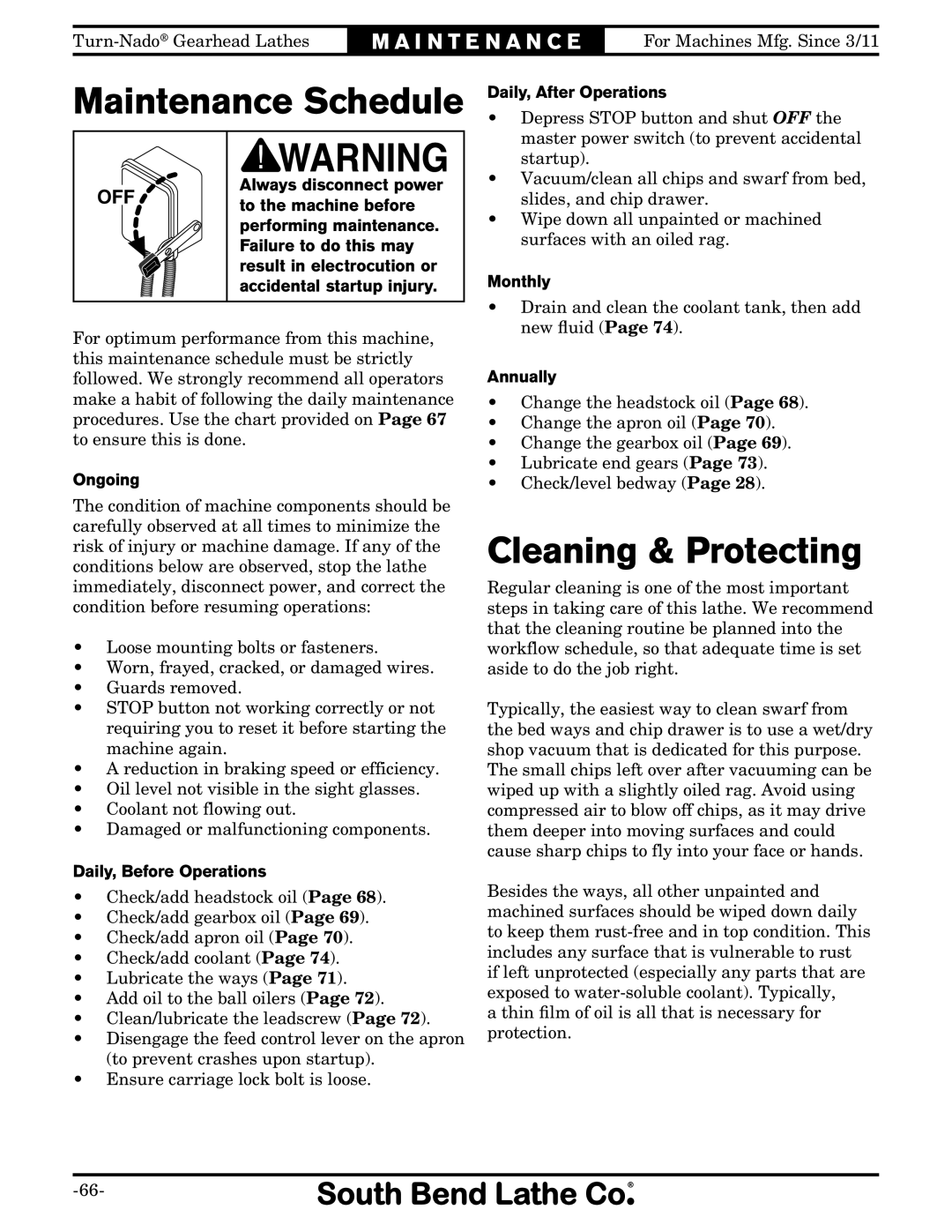
M A I N T E N A N C E | For Machines Mfg. Since 3/11 |
MAINTENANCE
Maintenance Schedule
OFF | Always disconnect power | |
to the machine before | ||
| ||
| performing maintenance. | |
| Failure to do this may | |
| result in electrocution or | |
| accidental startup injury. |
For optimum performance from this machine, this maintenance schedule must be strictly followed. We strongly recommend all operators make a habit of following the daily maintenance procedures. Use the chart provided on Page 67 to ensure this is done.
Ongoing
The condition of machine components should be carefully observed at all times to minimize the risk of injury or machine damage. If any of the conditions below are observed, stop the lathe immediately, disconnect power, and correct the condition before resuming operations:
•Loose mounting bolts or fasteners.
•Worn, frayed, cracked, or damaged wires.
•Guards removed.
•STOP button not working correctly or not requiring you to reset it before starting the machine again.
•A reduction in braking speed or efficiency.
•Oil level not visible in the sight glasses.
•Coolant not flowing out.
•Damaged or malfunctioning components.
Daily, Before Operations
•Check/add headstock oil (Page 68).
•Check/add gearbox oil (Page 69).
•Check/add apron oil (Page 70).
•Check/add coolant (Page 74).
•Lubricate the ways (Page 71).
•Add oil to the ball oilers (Page 72).
•Clean/lubricate the leadscrew (Page 72).
•Disengage the feed control lever on the apron
(to prevent crashes upon startup).
•Ensure carriage lock bolt is loose.
Daily, After Operations
•Depress STOP button and shut OFF the master power switch (to prevent accidental startup).
•Vacuum/clean all chips and swarf from bed, slides, and chip drawer.
•Wipe down all unpainted or machined surfaces with an oiled rag.
Monthly
•Drain and clean the coolant tank, then add new fluid (Page 74).
Annually
•Change the headstock oil (Page 68).
•Change the apron oil (Page 70).
•Change the gearbox oil (Page 69).
•Lubricate end gears (Page 73).
•Check/level bedway (Page 28).
Cleaning & Protecting
Regular cleaning is one of the most important steps in taking care of this lathe. We recommend that the cleaning routine be planned into the workflow schedule, so that adequate time is set aside to do the job right.
Typically, the easiest way to clean swarf from the bed ways and chip drawer is to use a wet/dry shop vacuum that is dedicated for this purpose. The small chips left over after vacuuming can be wiped up with a slightly oiled rag. Avoid using compressed air to blow off chips, as it may drive them deeper into moving surfaces and could cause sharp chips to fly into your face or hands.
Besides the ways, all other unpainted and machined surfaces should be wiped down daily to keep them
a thin film of oil is all that is necessary for protection.
